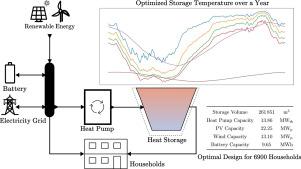Novel numerical method for simultaneous design and control optimization of seasonal thermal energy storage systems
IF 9.4
1区 工程技术
Q1 ENERGY & FUELS
引用次数: 0
Abstract
The transition to a carbon-neutral energy system requires widespread deployment of renewable energy sources and economically feasible energy storage solutions. This study presents a comprehensive optimization framework that jointly addresses the design and control of a nonlinear energy system supplying both heat and electricity to the Dietenbach district in Freiburg, Germany. The proposed system integrates solar and wind power with battery storage and seasonal thermal energy storage coupled via a heat pump, enhancing self-sufficiency and mitigating seasonal supply–demand mismatches. A multi-node lumped-parameter model captures heat transfer within the pit thermal energy storage, forming the basis of a periodic optimal control problem solved numerically. An averaging method reduces computation time by 80.5% while preserving fidelity for year-long optimization. A case study shows a projected total yearly energy cost of 5.93 €/m2 for combined heat and electricity, which is 73% lower than the German average. This study underscores the feasibility of designing economically viable, autonomous energy communities in real-world scenarios and provides an efficient, robust optimization framework for designing system components and operational control strategies.

季节性蓄热系统同步设计与控制优化的新数值方法
向碳中和能源系统的过渡需要广泛部署可再生能源和经济上可行的能源储存解决方案。本研究提出了一个综合优化框架,共同解决了为德国弗赖堡Dietenbach地区提供热量和电力的非线性能源系统的设计和控制。该系统将太阳能和风能与电池储能以及通过热泵耦合的季节性热能储存相结合,增强了自给自足并减轻了季节性供需不匹配。一个多节点集总参数模型捕获了坑式蓄能器内部的传热,构成了数值求解周期最优控制问题的基础。平均方法减少了80.5%的计算时间,同时保持了长达一年的优化保真度。一项案例研究表明,热电联产的预计年总能源成本为5.93欧元/平方米,比德国平均水平低73%。该研究强调了在现实场景中设计经济可行的自主能源社区的可行性,并为设计系统组件和运行控制策略提供了高效、稳健的优化框架。
本文章由计算机程序翻译,如有差异,请以英文原文为准。
求助全文
约1分钟内获得全文
求助全文
来源期刊

Energy
工程技术-能源与燃料
CiteScore
15.30
自引率
14.40%
发文量
0
审稿时长
14.2 weeks
期刊介绍:
Energy is a multidisciplinary, international journal that publishes research and analysis in the field of energy engineering. Our aim is to become a leading peer-reviewed platform and a trusted source of information for energy-related topics.
The journal covers a range of areas including mechanical engineering, thermal sciences, and energy analysis. We are particularly interested in research on energy modelling, prediction, integrated energy systems, planning, and management.
Additionally, we welcome papers on energy conservation, efficiency, biomass and bioenergy, renewable energy, electricity supply and demand, energy storage, buildings, and economic and policy issues. These topics should align with our broader multidisciplinary focus.
 求助内容:
求助内容: 应助结果提醒方式:
应助结果提醒方式:


